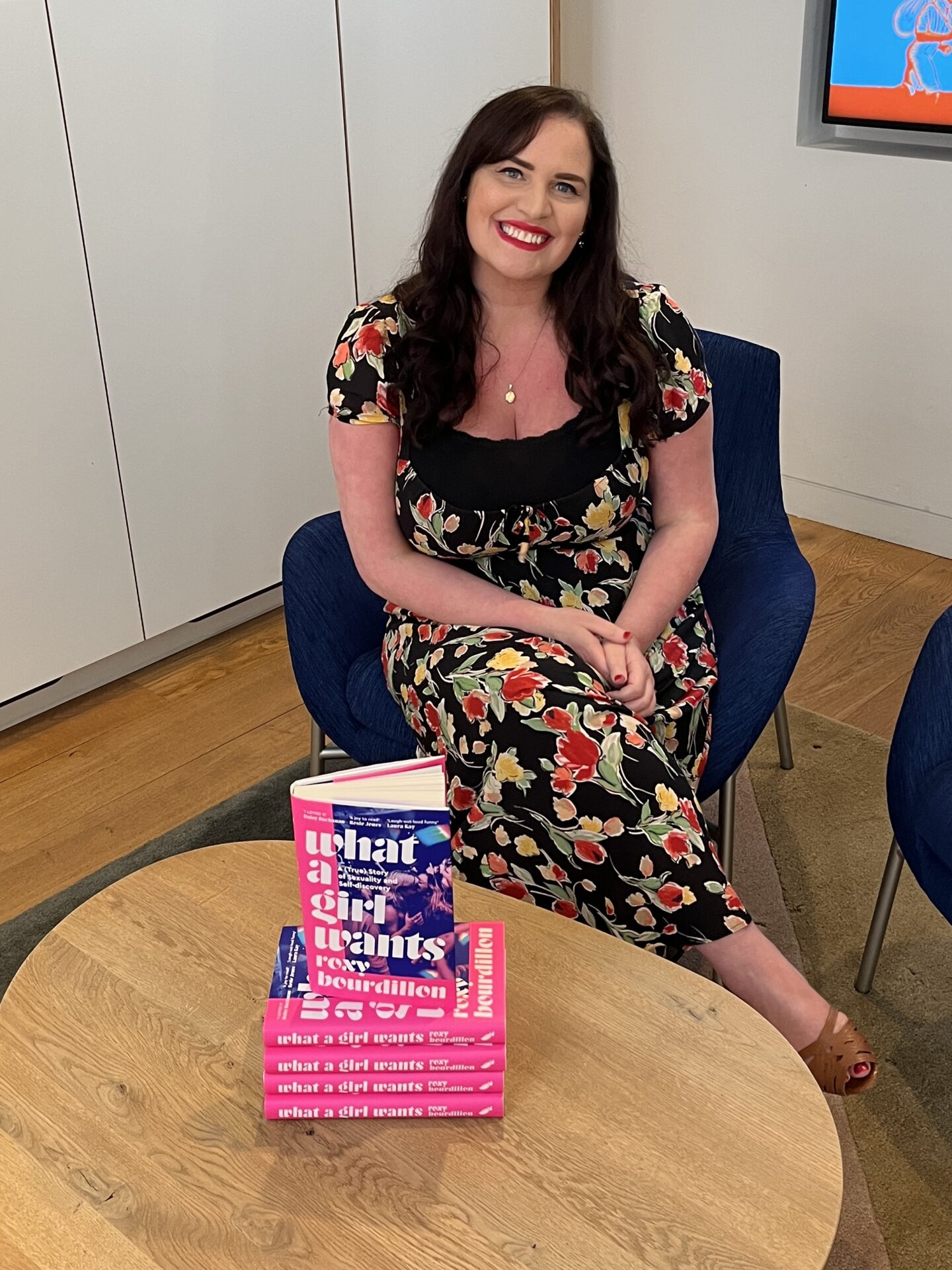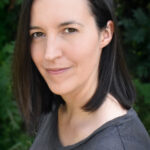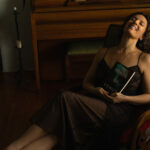Roxy Bourdillon is an award-winning journalist and the editor-in-chief of the iconic DIVA magazine. We had the chance to read her debut Novel “What A Girl Wants: A (True) Story Of Sexuality And Self-discovery” and have a chat with Roxy Herself.
Before diving into our interview with Roxy, we have to tell you about her jewel of a debut novel. From the very first sentence, Roxy, like a friend or a confidant, welcomes us into her world. We step into a touching, hilarious, thrilling, inspiring, and wonderfully relatable story.
Roxy dissects her life in her playful, witty, and unique style. She is not afraid to explore difficult topics, such as grief, anxiety, love, and self-acceptance, as well as the extremely relatable experience of making your dolls dry-hump each other in secrecy.
Inclusion is one of the key words in Roxy’s story. What a Girl Wants is a book for people who love women; whether you’re a lesbian, like Roxy, gay, pansexual, an ally or just a curious reader, we guarantee you will love her book.
Become a Nonchalant VIP for ad free browsing.
At the end of every chapter, Roxy treats us to a little surprise: from a list of fictional crushes and real diary entries, to a touching letter written by her grandmother. In “What A Girl Wants”, Roxy introduces herself to the reader in all her glory, and we cannot help but love her for it.

Read on if you want to learn more about Roxy and the many topics she discusses in her debut novel.
Article continues below.
Adolescence, Identity, and Acceptance
“It was important to me that my memoir wasn’t just a neat, cookie-cutter narrative. I didn’t want to oversimplify my story and the nuances of queer experiences. Real life is messy and complicated, and I wanted my book to explore that with honesty, heart and humour, while also hopefully taking the reader on an emotionally satisfying journey.”
Roxy opens this memoir by recalling her teenage years. With honesty and humour, she recounts her first kiss at 13 with her best friend, her years at an all-girls private school and her relationship with boys and dating. Moments that, in hindsight, seem hilariously obvious, but at the time were buried under thick layers of denial, social expectations and homophobia. Her experience and the similarities it bares with the lives of so many of us, queer folks, begs a question: Why is it so common for queer kids to miss the signs in themselves?
“When I was growing up, queerness was never presented as a possibility. So there I was, making my Barbies scissor, harbouring an immense crush on Jet from TV show Gladiators, and secretly snogging my friend, but I still didn’t know I was gay. When you are indoctrinated by the patriarchy from birth and – as I was – a massive people-pleaser, understanding your own identity can be a long and complicated process. Looking back on it now, it seems so obvious. The homosexual writing was well and truly on the wall! Yet still, I was a stranger to myself. This book is partly about what it really looks like to navigate that journey, untangling what I was told I should want from what I actually, authentically desire.”
In the novel, Roxy details her experience in school and the extremely codified courting rituals which left her feeling alienated. These expectations affects all teenage girls, but it is particularly painful to witness how they push queer girls to perform heterosexuality in order to be accepted by their peers. As readers, we cannot help but wonder what it was like for Roxy to look back at those moments and write about them with the clarity she has now.
“At times it was painful, at other times it was hilarious. While working on this memoir, I re-read my old teenage diaries, which by the way is one of the most cringe-inducing things a person can do. Revisiting past experiences made me laugh and cry. I think it’s important to be honest about the difficult parts of being queer, but it’s also healing to see the humour in some of that stuff. There’s a reason so many queer people are hilarious. We’ve had to be.”
What A Girl Wants is exceptionally candid. Roxy, in her writing, is unafraid to look at the ugly and difficult parts of growing up as a girl, especially one who is figuring herself out. She shows that lesbians are not exempt from craving male validation.
“It was important to me that my memoir wasn’t just a neat, cookie-cutter narrative. I didn’t want to oversimplify my story and the nuances of queer experiences. Real life is messy and complicated, and I wanted my book to explore that with honesty, heart and humour, while also hopefully taking the reader on an emotionally satisfying journey.”
When opening up about her younger self, Roxy touches on her experience as a schoolgirl under Section 28 in the UK. Section 28 is part of the 1988 Local Government Act, which stated that local authorities in England, Scotland and Wales could not intentionally promote homosexuality (learn more about Section 28 here). This impacted education all across the UK and led to the closure of many LGBTQ+ organisations and support groups.
Today, we’re seeing similar rhetoric on the rise, with book bans, school censorship, and queer erasure, all dressed up as “protecting” children and women. It seems particularly important to call out the real danger of these policies and teach young people about queer history.
“It’s vital. The world is a scary place right now, and I know firsthand how damaging it is when public systems shame us for simply existing. I’m gravely concerned about the recent rollbacks of LGBTQIA+ rights and the attacks on our trans siblings. It is so important that we call out these injustices. We can’t take our rights for granted. Learning about the history of our community gives us context and understanding. It gives us this empowering sense of having queer roots and being part of a diverse queer heritage. Queer people have always been here and we always will be. We are not the ones who are broken. We never were. What’s broken is the society that shames and others us.”
In the first chapters, Roxy reflects on growing up as the mitigator in her parents’ fractured marriage and how it affected her character and sense of self. Specifically, she explains how this delayed her coming out because she wanted to maintain “peace” within her family. We were curious to know what advice she would give to a person going through a similar experience.
“I’d say: I’m sorry you’re going through that. It can be really tough to feel that amount of pressure on your shoulders. Try and find someone in your life you can talk to about it, whether that’s a friend, partner or therapist. Because that is a heavy burden to be carrying alone.”
What A Girl Wants paints a raw and sincere depiction of coming out. From underwhelming to disappointing and bittersweet reactions, Roxy raises an important question: how do we come to terms with the fact that we may never receive the support and approval we long for?
“Being pragmatic and accepting the reality of certain situations can take time. Seeking out people, spaces and things that make you feel good about who you are, and help you embrace your whole self despite how other people might feel about that, is profoundly healing. Making space to experience and process any pain and sadness is important too. I also find journaling really useful for unravelling and releasing some of those knotty feelings.”
Coming out, especially in popular media, has predominantly been portrayed as a one-time life-changing event. However, many of us queer folks know that it is a lifelong process. How can we shift the narrative toward something more realistic?
“Sharing our experiences and talking honestly about what it’s really like to navigate life when you’re LGBTQIA+ is so important. The more queer stories and voices we have, the better. That helps create more understanding about the reality of our lives, fosters compassion in others and makes queer people feel less alone.”
Community, Pride & Joy
“I’ve been attending Pride for a long time, and this year it feels more important than ever to show up and stand in solidarity with our trans siblings. It is powerful to come together, to show ourselves and each other that we are not in this alone.“
What A Girl Wants feels like walking alongside Roxy through the many decisions, experiences, and relationships that have guided her path. In those heartwarming pages, we experience community joy, a true sense of belonging and radical pride.
Roxy reflects on the origin of Pride. She reminds us that even though we must affirm our identities and celebrate together, we cannot forget what pride is at its core: a protest, a place to experience both joy and rage.
“I’ve been attending Pride for a long time, and this year it feels more important than ever to show up and stand in solidarity with our trans siblings. It is powerful to come together, to show ourselves and each other that we are not in this alone. Things are difficult and we desperately need to make space for queer joy, so we can remember that our identities are something to be celebrated. Understandably, we have a hell of a lot of queer rage right now and we need to channel it into tackling the urgent issues facing our community.”
Throughout the book, Roxy highlights the importance of community with queer bars and clubs, safe spaces, shared rituals and experiences. Community seems vital for queer people.
“As queer people, sadly we often experience feelings of isolation and loneliness. When you go to a queer space and find yourself suddenly surrounded by other queer people, it presents you with undeniable evidence that you are not alone, that there are actually loads of other people like you. That can be a truly life-changing experience. It’s an antidote to all that time spent feeling othered.”
Queer spaces frequently struggle under the weight of gentrification. How can we protect queer spaces when more and more are disappearing?
“Queer people are amazingly resilient, creative and innovative. We’re actually really good at reinventing and regenerating queer spaces, finding new ways to gather and connect. We’re seeing that right now with the resurgence of sapphic and dyke nights, and the much-celebrated “lesbian renaissance”. And if we want queer spaces to keep existing, we have to show up and support them.”
In What A Girl Wants, Roxy reminds us that community can be found elsewhere, online, in fandoms, or through shared interests like her younger self’s favourite TV series, The L Word. For many queer teens, the internet is a place where they can finally be themselves. Often, online spaces can shape queer identity and foster connection.
“When I discovered The L Word, I was blown away. Yes, I was riveted by Shane looking very Shane today and Bette striding around in trouser suits, yelling at people! But I was also amazed to find out about the fandom that existed around the show. Back in the day, I remember listening to The Planet podcast, watching YouTube supercuts of the best (steamiest) scenes between Shane and Carmen, and spending hours scrolling through L Word message boards. It was mind-blowing because, as well as seeing these glossy LA lesbians onscreen, there was this immense, global network of real-life sapphics. Suddenly I knew they were out there and The L Word was like this sacred text that provided all these disparate queers with a common language. Fandoms help people find each other, while also getting to express their love of feeling seen in their favourite show.”
Throughout the book, Roxy talks of her experience watching lesbian characters being villainised on screen, queer characters being there only as comedic relief or as narrative tools to advance the straight character’s journey. She speaks about the impact representation, good, bad or absent, can have on a person. This makes us wonder what really happens when people finally see themselves reflected truthfully?
“It lets you know that you’re not the only one. It affirms your identity and helps liberate you from shame. It gives you a sense of possibility and power. For me, there wasn’t one single piece of media that provoked my lesbian awakening. It wasn’t as simple as seeing some women snog on TV and then immediately coming out of the closet. But every time I did see a sapphic onscreen and feel a frisson of recognition, it moved the dial a little bit further towards me, eventually accepting myself. It was an incremental, cumulative effect that took many years, but every one of those moments. Each one of them helped me to understand and embrace myself more fully. That is the power of representation.”
With her ever-so-witty anecdotes, Roxy shows how often media misrepresents or erases queer identity. She jokes about Ben Affleck’s seemingly magical knob, which “cures” lesbianism. This lighthearted tale raises a bigger question: how important is it, for all women, to witness depictions of desire that aren’t centred around men?
“Oh my god, it’s liberating, essential and empowering for all women to see that their lives, desires and identities do not have to be defined by men. Also, I’m glad you picked up on the reference to Ben’s “enchanted ding-dong”. I still can’t believe there are not one, but two films where the entire plot is: “she’s a lesbian… until she meets Ben Affleck”!”
Representation isn’t just about being visible; it’s about being represented well. When many companies seem to insert queer characters, in a lame attempt at diversity, they fail to represent the many realities, lives, and facets of queer people. In this context, it appears essential to empower independent queer media and community-led productions.
“When I was growing up, there was a woeful lack of lesbian representation. The first time I saw a lesbian character on TV was in Bad Girls, an ITV prison drama about bad girls doing bad. Because if we don’t tell our own stories, then either other people will tell them for us or our stories won’t be told at all. There is also a real power and energy in owning your story, declaring something of yourself to the world and expressing the truth of your experience (and occasionally) gay things behind bars. Don’t get me wrong, who doesn’t love a sapphic prison drama? But it’s not ideal if the only time you’re seeing lesbians onscreen, they are incarcerated criminals. If you compare that with lesbian representation today, it’s progressed massively. Now we have nuanced, diverse, queer characters in amazing shows like Heartstopper. We have our lesbian actors on the red carpet like Reneé Rapp and Jodie Foster. We have a whole wave of sapphic literature centering the perspectives of queer women and it’s all glorious. I couldn’t have imagined any of this when I was younger. I wonder how different my life might have been if I’d had this back then. Of course, there’s still a long way to go for us to achieve full, inclusive, intersectional lesbian visibility, but we have certainly progressed, and we’re actually living in a really exciting time for lesbian representation.”
Mental Health, Creativity & Systemic Struggles
“I don’t want to be all doom and gloom about it, though. Being a lesbian has also enriched my life, personally and professionally, and brought me so much joy. Plus, the sex is fantastic.”
One thing that is very striking about Roxy’s writing is her openness. She writes about heartbreak, shame, grief, mental health, sex, and all the messy parts that come with being human.
Roxy mentions how queer folk can struggle with their mental health, she writes about, ‘minority stress’, the idea that these mental health issues in queer communities can be caused by systemic oppression. Understanding this can help queer folk make sense of their struggles.
“It made a lot of sense to me when I learned about that concept. I don’t think being a lesbian is the only reason I’ve faced considerable challenges in my life so far. Life is challenging for all of us at times, however we identify. But I do think that my sexuality has made navigating so many aspects of my life much harder and more stressful. And that grinds you down, carrying that weight for years takes its toll. I don’t want to be all doom and gloom about it, though. Being a lesbian has also enriched my life, personally and professionally, and brought me so much joy. Plus, the sex is fantastic.”
In What a Girl Wants, Roxy touches on issues that may affect any of us, regardless of sexual orientation or gender identity. She speaks about her experience with work, her struggle with finding a job as a creative in this economy, and the toll it can have on one’s mental health. At times when it felt impossible, Roxy has managed to keep her passion alive.
“Honestly, I think it’s the fear of having a life devoid of creativity. That sounds a bit pretentious, but even if you’re not being creative for your job, there is so much self-expression and self-knowledge you can access through creativity. My career journey was not an easy one. I spent a decade working in soul-sapping jobs that I hated, trying and failing to get work in a creative field. Throughout all those years of knockbacks, I did often think I’d have to give up on my dreams. And I wondered if I wasn’t getting anywhere partly because of my sexuality. But even when it seemed impossible, I always kept being creative in some way, whether it was blogging or writing sketches or taking part in a quirky fringe theatre show. It’s powerful to keep that spark alive, even if it’s just for yourself.”
Many queer people seem to feel this pressure to succeed, this need to prove themselves. We cannot help but wonder why that’s such a common thread in our community.
“I wonder if it might be to do with us often feeling othered, and perhaps even less worthy, as queer people. When you’re not the “norm”, it makes sense that you have more of an urge to prove your worth. Maybe we want to achieve things to show people that no matter what they think of our identities, we have something to offer.”
When witnessing Roxy’s vulnerability in her writing, we couldn’t help but wonder how challenging it must have been.
“I have always worried about being “too much” and at the same time “not enough”. But I knew that in writing this book, I had to go all in. I had to write with passion and gusto and heart, because that’s who I am and that’s how I tell stories. It can be intimidating to be vulnerable in your writing, but when I hear from readers who have read my book and felt moved, empowered or entertained by the words I have written, it’s so worth it.”
Misogyny, Feminism & Intersectionality
“It’s powerful, defiant and hot. It’s actually one of my favourite things about being a lesbian. For me personally, it feels profoundly liberating to live a life that is not defined by men.”
Throughout the book, there is a constant protest, a refusal to shrink, as a lesbian, as a woman and a feminist. What a Girl Wants is a celebration of queer joy and desire.
Roxy describes her lesbian identity not just as something personal, but as something political, emotional, and professional, especially with her job at DIVA magazine. She starts the book unable to say the word lesbian, and ends it by owning it proudly. Reclaiming the word seemed a central part of Roxy’s story.
“For a very long time, the word ‘lesbian” really bothered me. Now, I say it every day. I say it so often it no longer makes me flinch. I am a professional lesbian. I lesbian for a living. I also lesbian in my free time. I have really gone all-in on lesbianing! I’m comfortable with the word now. I can joke about with it and play with it and own it, but it took a long time to get to that place. I used to feel like the word “lesbian” was clunky and embarrassing, a target on my back and a mark of shame. Now I understand that there is nothing shameful about being a lesbian. That knowledge makes me want to reclaim it, to say it with relish and encourage other lesbians to do the same.”
Here, Roxy speaks, not just as a lesbian, but as a woman moving through a world rooted in violence and misogyny. In our society, which constantly tries to define women through their relationships with men, we wonder what it means to be a lesbian.
“It’s powerful, defiant and hot. It’s actually one of my favourite things about being a lesbian. For me personally, it feels profoundly liberating to live a life that is not defined by men.”
What a Girl Wants paints sexuality almost as an act of resistance, both from patriarchal beauty standards and societal expectations. It seems, then, that being a lesbian and participating in lesbian sex offers the chance to reclaim your body and pleasure on your own terms.
“Yes! There’s also something about the potency of lesbian sex that is, in my experience, undeniable. It can be so incredibly intimate, healing and rejuvenating. I love that we get to define our own desire and make up our own rules. In What A Girl Wants, there’s a chapter called “I love women’s bodies, but can I love my own?” I’ve always struggled with body image. I’ve yo-yo dieted, starved myself, over-exercised to the point of injury, and bitterly, venomously loathed my own physical form since before I started school. I’ve been in some really dark places with that stuff. But then, when I was single and on the scene, I had this one-night stand with a gorgeous, voluptuous woman I met in a gay bar. It was the first time I’d ever been with a woman who had a body that looked like mine, and she was so hot. She was magnificent, my desire for her body was abundantly apparent, and the sex was epic. That encounter helped me reframe how I look at my own body. It wasn’t that it cured my hang-ups forever, but it did help me see that beauty really does come in all shapes and sizes. It was a genuinely profound one-night stand!”
There’s a clear frustration in the book about how mainstream sex ed and porn fail us, especially as queer people and women.
“I was at school during Section 28, the poisonous UK law that made it illegal for teachers to say anything good about queer people. They literally introduced it the year I started nursery and didn’t repeal it until I left sixth form – a timeline I can’t help taking personally! So in our sex ed, as in all of our lessons, queerness was never spoken about. That’s really damaging and, from a sex ed point of view, potentially dangerous. Even post-Section 28, there’s still not enough inclusive sex ed in schools. It’s important that people get accurate, inclusive, age-appropriate information about safe, consensual sex and how that can look for LGBTQIA people. It’s really important that people aren’t just getting their sex info from mainstream, heteronormative porn.”
In her book, Roxy highlights the fact that queerness doesn’t make us immune to replicating systems of oppression like racism, sexism, or transphobia. It makes us wonder what kinds of conversations and actions we need to take in order to move toward real intersectional solidarity.
“It is devastating to see how divided queer people can be within our own ranks, from transphobia and racism to ableism and biphobia. It’s so misguided when queer people turn on other queer people. It’s vital that we have conversations and make space for our whole, intersectional community, especially the most marginalised among us. We need to do more listening and lifting each other up. Compassion and active allyship are essential. We are so much stronger if we stand together.”
In What a Gil Wants, Roxy, shares her first-hand experience with discrimination and the reproduction of mainstream social expectations within the queer community. She mentions Femmephobia and Butchphobia and how, although they are often overlooked in mainstream feminism, they affect all women.
“I have experienced femmephobia ever since I came out, from men threatening to “turn” me because they see a femme lesbian as a sexual invitation and a creepy challenge, to bouncers denying me access to gay bars because I don’t “look gay enough” (seriously, why else would a woman this glamorous have nails this short?!). Sadly, butch people also often have to navigate a whole other set of stereotypes, harassment and abuse because of butchphobia. Femmephobia is a feminist issue, and so is butchphobia, because it all comes back to judging a woman on how she looks, reducing us to our physical appearance and this sense of entitlement to comment, ridicule and harm us. It all stems from the same set of limiting beliefs about what a woman can and should be. It’s sexism, but with added homophobia, and these misogynistic stereotypes hurt all women, however they identify.”
Love, Friendship, and Harmony
“We spend so much time trying to find a home in other people, but finding home within yourself is perhaps the most fundamental home you can have.“
One of the threads running through Roxy’s book and, more importantly, her life, is her appreciation for the many relationships she has with other women.
What a Girl Wants is a love letter to women, not only romantic love, but in every sense of the word: friendships, family, care, and community. In our heteronormative society, romantic love sits at its centre. It seems particularly important, especially as queer folks, to speak out against that.
“Romantic love can be glorious. I am a big fan of being in love with another woman, and all the joy and intimacy that can bring to your life. But that isn’t the whole story of what it means to be a lesbian, to be a woman, to be a person. There are so many different ways we can embrace love in our lives and different connections that nourish us. And for me, some of the most meaningful relationships with other women have been platonic. They’ve been my friendships and my close connection with my incredible granny. Those relationships can be just as formative, affirming and full of love as romantic partnerships.”
While reading What a Girl Wants, it feels impossible not to be moved by the tenderness with which Roxy writes about her grandmother. Many of us who’ve had close relationships with grandmothers view them as essential to our sense of self. Often, these relationships shape how we see the world and the place we hold within it.
“I adored the bones of my granny. Still do. And I hope when people read my book, they adore her too. So far, they have! So our relationship – we really saw each other and really loved each other. I learned so much from her about how I want to move through the world. In many ways, she has shaped who I am, from my love of vintage glamour to my passion for creativity to how I try to make people feel when I talk to them –comfortable, entertained, heard, connected. I have always had a deep love of women, not just in a romantic sense. For as long as I can remember, I’ve thought women were bloody incredible. I wanted to hear their opinions, read their stories, listen to their songs. That love of women was really the starting block for my feminism. I knew I was a feminist long before I knew I was queer. In primary school, I voluntarily did a project on women’s rights. I was a tiny feminist and a massive geek! And so much of my initial devotion to women comes from my lifelong love and admiration for my granny.”
Roxy’s book reminded us how powerful intergenerational relationships can be. It makes question the importance of such relationships within the queer community. Shouldn’t we foster bonds and communication across generations of queer folks and learn from those who came before us?
“Yes! We can learn so much from speaking to people of different ages, whether that means people who are younger or older than us. It’s also how you build a stronger community and help each other feel connected and valued.”
Roxy concludes her book with this powerful and poetic sentiment: “I am myself, and I am home.” So, what does it really mean to be “home”?
“We spend so much time trying to find a home in other people, but finding home within yourself is perhaps the most fundamental home you can have. Self-knowledge, self-compassion, understanding of who you are and running towards that, not away from it, that’s home to me.”
After devouring Roxy’s book and getting to know her a little better, we urge you to pick up your own copy! Self-aware, bright and poignant at times, “What A Girl Wants” is a beautiful piece of life, full of ups and downs, history, community, love, and necessary questions for the future.
What A Girl Wants: A (True) Story Of Sexuality And Self-discovery by Roxy Bourdillon is published by Bluebird, Pan Macmillan, and is out now in hardback and audiobook. Click here to find out more.
Do not forget to follow Roxy on Instagram for updates about her work.
Until then, stay proud!
Nonchalant X





